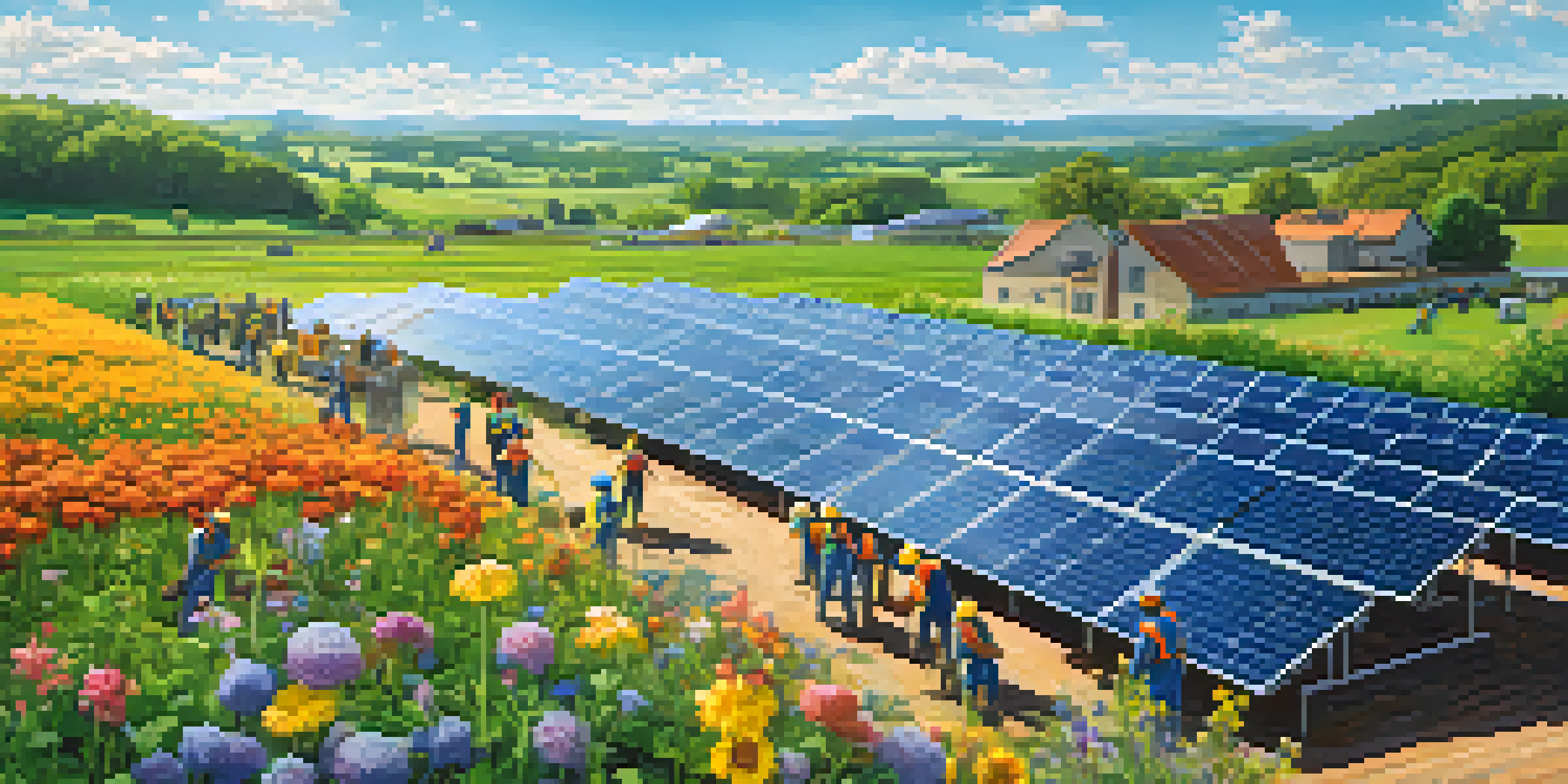Green Jobs: The Rise of Sustainability in the Job Market

Understanding Green Jobs and Their Importance
Green jobs are positions that contribute to preserving or restoring the environment. They span various industries, from renewable energy to sustainable agriculture, showcasing a growing commitment to sustainability in the workplace.
The future will be green, or not at all.
As climate change and environmental degradation become more pressing issues, the demand for green jobs has surged. This shift not only helps the planet but also creates new economic opportunities, ensuring job seekers can find meaningful work.
By focusing on sustainability, green jobs promote a healthier planet while also supporting local economies. This dual benefit makes them an appealing option for both workers and employers looking to invest in the future.
The Growth of Green Jobs in Various Industries
Green jobs are not confined to one industry; they are flourishing across various sectors. From solar panel installation to energy-efficient construction, these roles are becoming essential as companies pivot towards sustainability.

For instance, the renewable energy sector has seen explosive growth, with jobs in wind and solar energy skyrocketing. This trend indicates a significant shift in how industries prioritize sustainability, which is now a central focus for many businesses.
Green Jobs Boost Economic Opportunities
The rise of green jobs not only addresses environmental challenges but also creates meaningful employment options for job seekers.
Moreover, traditional industries are also embracing greener practices. For example, agriculture is evolving with sustainable farming techniques that create jobs while protecting our natural resources.
Skills Needed for a Career in Green Jobs
To thrive in green jobs, specific skills are becoming increasingly valuable. Technical skills related to renewable energy, environmental science, and sustainable practices are in high demand.
We do not inherit the earth from our ancestors; we borrow it from our children.
However, it's not just about technical know-how; soft skills like problem-solving and creativity are equally important. These skills help individuals tackle complex environmental challenges and innovate sustainable solutions.
Educational programs are adapting to this demand, offering specialized courses and training. This shift not only prepares the workforce for green jobs but also empowers individuals to contribute to a sustainable future.
The Role of Government in Promoting Green Jobs
Government policies play a crucial role in fostering the growth of green jobs. By implementing incentives for renewable energy projects and sustainable practices, governments can stimulate job creation in these sectors.
For example, subsidies for solar energy installations encourage homeowners and businesses to invest in renewable sources. This, in turn, creates jobs in manufacturing, installation, and maintenance within the green energy sector.
Skills for a Sustainable Future
Technical and soft skills are essential for success in green jobs, leading to educational programs that prepare individuals for these roles.
Furthermore, international agreements focused on climate change are pushing nations to adopt greener policies. These commitments not only promote sustainability but also drive job creation on a global scale.
How Businesses Are Adapting to Sustainability Trends
Businesses are increasingly recognizing the importance of sustainability as consumer preferences shift. Companies are integrating environmentally friendly practices into their operations, resulting in the creation of green jobs.
For instance, many businesses are adopting circular economy principles, which focus on reducing waste and reusing materials. This transition requires new roles dedicated to sustainability management and environmental compliance.
As a result, organizations that prioritize sustainability not only enhance their brand image but also attract eco-conscious consumers, leading to long-term growth and stability.
The Impact of Green Jobs on Local Economies
Green jobs significantly impact local economies by creating new employment opportunities. As businesses invest in sustainable practices, they often hire locally, boosting community employment rates.
Moreover, these jobs can lead to increased spending within communities, as employees earn wages that circulate in the local economy. This can have a ripple effect, fostering growth in various sectors beyond just the green economy.
Government's Role in Green Growth
Government policies and incentives are crucial in promoting green jobs, driving job creation through sustainable practices and renewable energy initiatives.
Additionally, as more individuals enter the workforce through green jobs, local governments can benefit from increased tax revenue. This revenue can then be reinvested into community programs and infrastructure, further enhancing the local economy.
Future Outlook: The Sustainability Job Market
Looking ahead, the sustainability job market is poised for continued growth. As global awareness of environmental issues increases, so will the demand for skilled professionals in green sectors.
Emerging technologies, such as electric vehicles and smart grids, are set to create new job opportunities that didn’t exist a decade ago. This evolution reflects a broader trend towards innovation within the sustainability space.

As we move toward a greener future, individuals who embrace and adapt to these changes will find themselves at the forefront of a thriving job market that prioritizes both economic stability and environmental health.